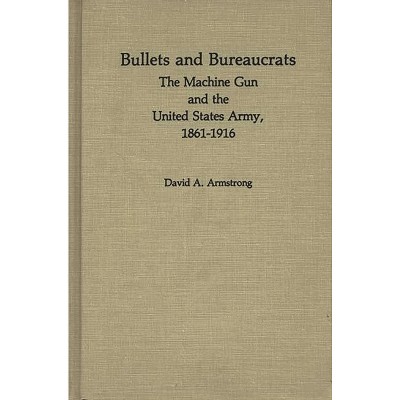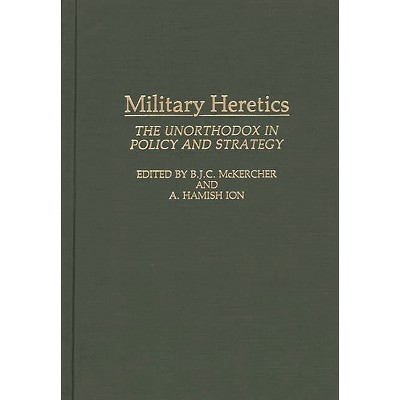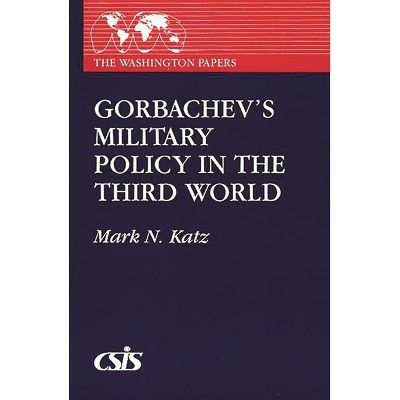Sponsored

Changing Military Doctrine - by Sten Rynning (Hardcover)
In Stock
Sponsored
About this item
Highlights
- As Rynning shows, armed forces have a natural interest in shaping military doctrine according to their resources, doctrinal traditions, as well as their assessment of the international environment.
- About the Author: STEN RYNNING is a Research Fellow with the Copenhagen Peace Research Institute, a Lecturer with the Institute of Political Science, University of Copenhagen, and a Research Fellow with the NATO Europe-Atlantic Partnership Council.
- 256 Pages
- Technology, Military Science
Description
About the Book
As Rynning shows, armed forces have a natural interest in shaping military doctrine according to their resources, doctrinal traditions, as well as their assessment of the international environment. However, armed forces are also the instrument of policy-makers who are in charge of national security. Using civil-military relations in France from 1958 to the present as a case study, he shows when policy-makers are capable of controlling military doctrine as well as the means armed forces rely on to influence doctrine.
Some scholars argue that policy-makers can control military doctrine only when the international environment is threatening--a situation granting them added decision-making authority. Others argue that such control ultimately depends on the degree of domestic political disagreement/consensus. With access to most of the leading military personnel and policy-makers of the era, Rynning provides an analysis that will be instructive to scholars as well as policy-makers and military leaders concerned with contemporary civil-military relations.
Book Synopsis
As Rynning shows, armed forces have a natural interest in shaping military doctrine according to their resources, doctrinal traditions, as well as their assessment of the international environment. However, armed forces are also the instrument of policy-makers who are in charge of national security. Using civil-military relations in France from 1958 to the present as a case study, he shows when policy-makers are capable of controlling military doctrine as well as the means armed forces rely on to influence doctrine.
Some scholars argue that policy-makers can control military doctrine only when the international environment is threatening--a situation granting them added decision-making authority. Others argue that such control ultimately depends on the degree of domestic political disagreement/consensus. With access to most of the leading military personnel and policy-makers of the era, Rynning provides an analysis that will be instructive to scholars as well as policy-makers and military leaders concerned with contemporary civil-military relations.Review Quotes
"At last a clear analysis of French military strategy from 1958 to 2000, in which Sten Rynning successfully identifies the dominating factors."-Maurice Schmitt General Chief of Staff of the French Armed Forces, 1987-1991
"Using neoclassical realist theory Rynning deftly shows how French presidents in collusion with handpicked innovative generals overcame domestic resistance to national security policy change. Contradicting conventional wisdom French leaders have used allied commitments to shelter doctrinal change, improving cooperation in NATO. This is a highly innovative and readable study of military doctrinal change using the Fifth Republican as field of exploration."-Ingemar Dorfer Professor Swedish Defence Research Agency
.,."useful analysis of French national security decision making and the tensions among nationalist, European, and Atlanticist factions in France. Graduate students and faculty."-CHOICE
.,."what we have here is a welcome additional insight into French policy-making in general, and military policy...has much to recommend it."-European Foreign Affairs Review
.,."Rynning has given us a most useful and stimulating work. Strategists, in uniform or in armchair, will find it indespensible."-The Journal of Military History
?...useful analysis of French national security decision making and the tensions among nationalist, European, and Atlanticist factions in France. Graduate students and faculty.?-CHOICE
?...what we have here is a welcome additional insight into French policy-making in general, and military policy...has much to recommend it.?-European Foreign Affairs Review
?...Rynning has given us a most useful and stimulating work. Strategists, in uniform or in armchair, will find it indespensible.?-The Journal of Military History
?Changing Military Doctrine is a compulsory read not only for security scholars but also for students of modern French politics and history.?-European Security
..."what we have here is a welcome additional insight into French policy-making in general, and military policy...has much to recommend it."-European Foreign Affairs Review
..."Rynning has given us a most useful and stimulating work. Strategists, in uniform or in armchair, will find it indespensible."-The Journal of Military History
"Changing Military Doctrine is a compulsory read not only for security scholars but also for students of modern French politics and history."-European Security
..."useful analysis of French national security decision making and the tensions among nationalist, European, and Atlanticist factions in France. Graduate students and faculty."-CHOICE
About the Author
STEN RYNNING is a Research Fellow with the Copenhagen Peace Research Institute, a Lecturer with the Institute of Political Science, University of Copenhagen, and a Research Fellow with the NATO Europe-Atlantic Partnership Council./e Dr. Rynning has published extensively in scholarly journals.Shipping details
Return details
Frequently bought together

Trending Computers & Technology Books
















